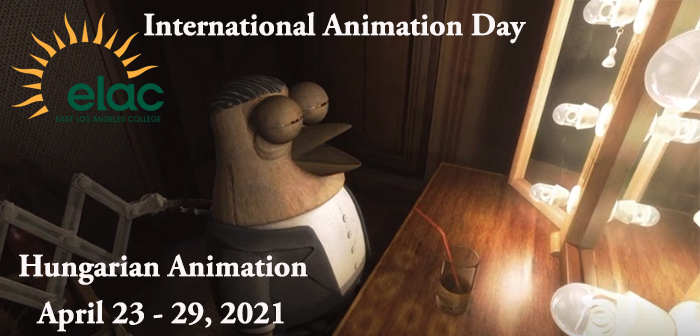East Los Angeles College, National Film Institute Hungary – Film Archive, Hungary’s KEDD Animation Studio, and Cinema and Without Borders Foundation presented the Hungarian Animation Day, the seventh edition of the annual East Los Angeles College International Animation Day Festival featuring short animated films from Hungary.
The goal of the ELAC International Animation Festival is to give an in-depth and entertaining introduction to contemporary international animation. Screenings of short animated films from around the world, analyses and Q&As with a panel of well-known animation experts, and a tribute to an international animation artist working in the U.S. animation industry are all part of the festival program.
Program:
- Opening Remarks by Linda Kallan, Chair of Art Department at ELAC, Bijan Tehrani, Editor in Chief of Cinema Without Borders and director of the Festival
- Brigitta Iványi-Bitter makes an introduction to Hungarian animation.
- Screening of Hungarian short, animated films
- Panel discussion about screened short films.
- Spotlight: KEDD Animation Studio
- Tribute: Gyula Macskássy
- Closing Remarks by Linda Kall
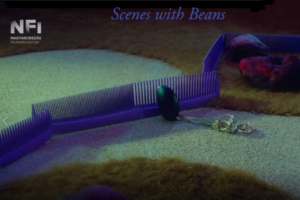
Hungarian Short animated Films Screening:
- Scenes with Beans/Babfilm (directed by Ottó Foky, production year: 1975, length: 12 min)
- Gobble-Gobble/Hamm (directed by István Bányai, production year: 1977, length: 6 min)
- Wind/A szél (directed by Csaba Varga production year: 1985, length: 5 min)
- Rondino (directed by Csaba Szórády, production year: 1977, length: 3 min)
- Wizards/Garabonciák (directed by Dóra Keresztes, production year: 1985, length: 5 min)
- Panik/Pánik (directed by Sándor Reisenbüchler, production year: 1975, length: 9min)
- Nights in the Boulevard/Körúti Esték (directed by György Kovásznai, production year: 1972, length: 9 min)
- Maestro: Oscar nominated short film by Geza M. Toth KEDD Animation Studio, 2005
- Mama: A short film by Geza M. Toth KEDD Animation Studio, 2009
Panel Members:
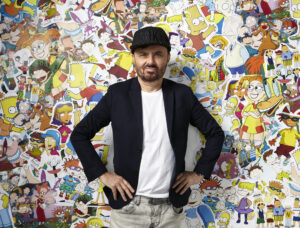 GABOR CSUPO, born on 1952 is a U.S. cartoon animator; and founders/co-chair with Arlene Klasky, of Klasky Csupo. Csupo, born in Budapest, Hungary, learned animation at Pannonia Studio. He escaped Communist Hungary in 1975 and made his way to Stockholm, where he met Arlene Klasky. A graduate of California Institute of the Arts, Klasky worked as a designer for record labels such as A&M Records, served as a magazine and advertising art director, and then moved to special effects and graphics for film. The couple relocated to Los Angeles and formed Klasky Csupo, Inc. in 1982. In 1988, James L. Brooks awarded the company the job of animating The Simpsons for Fox’s The Tracey Ulman Show. Klasky Csupo, Inc. subsequently created such animated shows as Rugrats (1991), a cartoon told from a child’s point of view, Duckman (1994), The Wild Thornberrys (1998), and As Told by Ginger (2000). Rugrats features Passover and Hanukkah episodes and its Jewish main character, Tommy Pickles, is based on Klasky’s experiences with his sons Brandon and Jarrett. Feature films included The Rugrats Movie (1998), Rugrats in Paris (2000), The Wild Thornberrys Movie (2002), and the crossover film Rugrats Go Wild! (2003).
GABOR CSUPO, born on 1952 is a U.S. cartoon animator; and founders/co-chair with Arlene Klasky, of Klasky Csupo. Csupo, born in Budapest, Hungary, learned animation at Pannonia Studio. He escaped Communist Hungary in 1975 and made his way to Stockholm, where he met Arlene Klasky. A graduate of California Institute of the Arts, Klasky worked as a designer for record labels such as A&M Records, served as a magazine and advertising art director, and then moved to special effects and graphics for film. The couple relocated to Los Angeles and formed Klasky Csupo, Inc. in 1982. In 1988, James L. Brooks awarded the company the job of animating The Simpsons for Fox’s The Tracey Ulman Show. Klasky Csupo, Inc. subsequently created such animated shows as Rugrats (1991), a cartoon told from a child’s point of view, Duckman (1994), The Wild Thornberrys (1998), and As Told by Ginger (2000). Rugrats features Passover and Hanukkah episodes and its Jewish main character, Tommy Pickles, is based on Klasky’s experiences with his sons Brandon and Jarrett. Feature films included The Rugrats Movie (1998), Rugrats in Paris (2000), The Wild Thornberrys Movie (2002), and the crossover film Rugrats Go Wild! (2003).
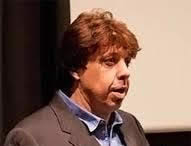 Mike Libonati Mike works in 2D and 3D development for various clients in both film and television. He has worked on projects for Disney Feature, Cartoon Network, Universal and Fox. He has also worked on renderings for architectural lighting design on projects such as the Coex Mall in Korea, Asia’s largest underground mall and Tesla Motor Company in Los Angeles. In addition to his professional work, Mike has been an animation and visual effects teacher for over 15 years. He has a Master’s Degree from CalArts in Experimental Animation. He currently is teaching animation at East Los Angeles College and is designing exciting new animated projects with Animation Libation Studios.
Mike Libonati Mike works in 2D and 3D development for various clients in both film and television. He has worked on projects for Disney Feature, Cartoon Network, Universal and Fox. He has also worked on renderings for architectural lighting design on projects such as the Coex Mall in Korea, Asia’s largest underground mall and Tesla Motor Company in Los Angeles. In addition to his professional work, Mike has been an animation and visual effects teacher for over 15 years. He has a Master’s Degree from CalArts in Experimental Animation. He currently is teaching animation at East Los Angeles College and is designing exciting new animated projects with Animation Libation Studios.
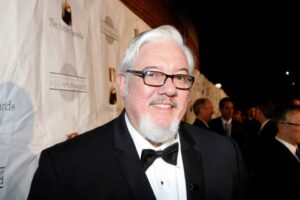 Tom Sito is an animator, historian and professor at the University of Southern California. His 32 movie credits include Beauty and the Beast (1991), Who Framed Roger Rabbit (1988), The Little Mermaid (1989), Aladdin (1992), The Lion King (1994), The Prince of Egypt (1999), Shrek (2001), Osmosis Jones (2001) and Looney Tunes: Back in Action (2003). He is President Emeritus of The Hollywood Animation Guild, was on the Board of Governors of the Motion Picture Academy of Arts & Sciences, and the National Cartoonists Society. He is the author of several books, including: Drawing the Line: The Untold Story of the Animation Unions from Bosko to Bart Simpson, Moving Innovation: A History of Computer Animation, and Eat, Drink, Animate, An Animator’s Cookbook.
Tom Sito is an animator, historian and professor at the University of Southern California. His 32 movie credits include Beauty and the Beast (1991), Who Framed Roger Rabbit (1988), The Little Mermaid (1989), Aladdin (1992), The Lion King (1994), The Prince of Egypt (1999), Shrek (2001), Osmosis Jones (2001) and Looney Tunes: Back in Action (2003). He is President Emeritus of The Hollywood Animation Guild, was on the Board of Governors of the Motion Picture Academy of Arts & Sciences, and the National Cartoonists Society. He is the author of several books, including: Drawing the Line: The Untold Story of the Animation Unions from Bosko to Bart Simpson, Moving Innovation: A History of Computer Animation, and Eat, Drink, Animate, An Animator’s Cookbook.
Spotlight
 In Spotlight section of our program, we will screen a short documentary about KEDD Animation Studio in Hungary and then we follow the screening by two productions of the Oscar-nominee director Géza M. Tóth, the founder and leader of KEDD Animation Studio Ergo and Matches. In our main screening section we had two other shorts from KEDD Animation.
In Spotlight section of our program, we will screen a short documentary about KEDD Animation Studio in Hungary and then we follow the screening by two productions of the Oscar-nominee director Géza M. Tóth, the founder and leader of KEDD Animation Studio Ergo and Matches. In our main screening section we had two other shorts from KEDD Animation.
More about the director
Géza M. Tóth is an Oscar nominated filmmaker, PhD university professor and head of KEDD Animation Studio. He has been teaching from 1994 at some of the most prestigious art universities in Europe, such as MOME – Moholy-Nagy University of Art and Design, Royal College of Art in London, University of Theatre and Film in Budapest. From 2020 he also runs one of the most successful East-European animation film studios, named KEDD. He is a member of the Academy of Motion Picture Arts and Sciences, and the International Academy of Television Arts and Sciences.
(He is a multifarious artist, works in a huge palette of the arts: director of short films (ex: Icar, MAESTRO, ERGO, MAMA) and animation tv series (ex: Berry and Dolly, The Kuflis). He also works as a director for theater and operas (ex: Nibelungen, The Miraculous Mandarin, The Bluebeard’s Castle), illustrating books, lecturing, scriptwriting.
 His films have won more than 120 prizes. His first film, The Pied Piper of Hamelin (1992) was selected for Annecy, the second – Icarus (1996) was nominated for the Golden-Bear in Berlin. His film, Maestro (2005) was nominated for the Oscar in 2007 in the Best Animated Short Film category. His latest animation short, MATCHES, put him in the Oscar Race again, since has won the Oscar qualifying Light in Motion Award for Best Animated Short Film at the Foyle Film Festival in 2019.)
His films have won more than 120 prizes. His first film, The Pied Piper of Hamelin (1992) was selected for Annecy, the second – Icarus (1996) was nominated for the Golden-Bear in Berlin. His film, Maestro (2005) was nominated for the Oscar in 2007 in the Best Animated Short Film category. His latest animation short, MATCHES, put him in the Oscar Race again, since has won the Oscar qualifying Light in Motion Award for Best Animated Short Film at the Foyle Film Festival in 2019.)
MAESTRO: Five minutes before the big performance Maestro is getting ready behind the curtain. Time is slowly ticking away. Oscar nominated short film by Geza M. Toth – KEDD Animation Studio – 2005.
MAMA: A tale of a worldwide hanging out. Short film by Geza M. Toth – KEDD Animation Studio – 2009.
ERGO: A story about the music in us. Short film by Geza M. Toth – KEDD Animation Studio – 2008.
MATCHES: Children’s fantasy is endless! We can catch their thoughts while they’re playing. The basic inspiration for MATCHES was given by an interview with a 7 year old child, who shares with us his honest and innocent thoughts.
Finding joy and wonder in playing with colorful matchsticks the young boy’s imagination becomes visible, while he complains about grownup rules and talks about his dreams, fears and hopes. The film attempts to take us back to the innocent fantasy world, where endless and wonderful imagination comes to life.
Tribute to a Legend: Gyula Macskássy
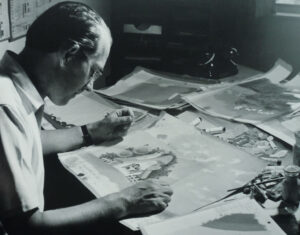 Although there were animation experiments made in Hungary long before Gyula Macskássy (1912–1971), his work made the world discover Hungarian animation. Regular animation film production began in the private commercial film studio founded by Gyula Macskássy, John Halas (born János Halász) and Félix Kassowitz (the grandfather of the well-known French actor–director, Mathieu Kassovitz) during the 1930-40s. It is also Macskássy’s merit that animation film production did not come to an end after WWII – he became the leading director of the state-owned Pannonia Film Studios in the 1950s.During the centralized communist film production of the 1950s, Macskássy’s oeuvre consisted of adaptations of classical animal fables that combined elements of Hungarian folklore with the realistic styles of Soviet animated film and the live-action film effects of Disney films with A kiskakas gyémánt félkrajcárja (The Little Rooster’s Diamond Half-Penny, 1951) and Két bors ökröcske (The Two Weeny Oxen, 1955).
Although there were animation experiments made in Hungary long before Gyula Macskássy (1912–1971), his work made the world discover Hungarian animation. Regular animation film production began in the private commercial film studio founded by Gyula Macskássy, John Halas (born János Halász) and Félix Kassowitz (the grandfather of the well-known French actor–director, Mathieu Kassovitz) during the 1930-40s. It is also Macskássy’s merit that animation film production did not come to an end after WWII – he became the leading director of the state-owned Pannonia Film Studios in the 1950s.During the centralized communist film production of the 1950s, Macskássy’s oeuvre consisted of adaptations of classical animal fables that combined elements of Hungarian folklore with the realistic styles of Soviet animated film and the live-action film effects of Disney films with A kiskakas gyémánt félkrajcárja (The Little Rooster’s Diamond Half-Penny, 1951) and Két bors ökröcske (The Two Weeny Oxen, 1955).
From the second half of the 1950s, his films were tuned to harmonize with the times, and were usually 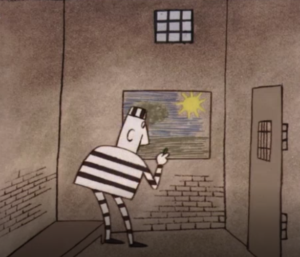 parodies of classic fairy tales: Az okos lány (Smart Girl, 1956) Egér és orosz-lán (The Mouse and the Lion, 1957) and A taleteller méhecske (The Greedy Bee, 1958). His film A ceruza és a radír (The Pencil and Rubber) gained Hungarian animation an international reputation. Created together with caricature artist György Várnai, this ten minute animation replaced dialogue-based, fairy-tale films with a visually new animation style and epigrammatic story-telling.
parodies of classic fairy tales: Az okos lány (Smart Girl, 1956) Egér és orosz-lán (The Mouse and the Lion, 1957) and A taleteller méhecske (The Greedy Bee, 1958). His film A ceruza és a radír (The Pencil and Rubber) gained Hungarian animation an international reputation. Created together with caricature artist György Várnai, this ten minute animation replaced dialogue-based, fairy-tale films with a visually new animation style and epigrammatic story-telling.
Macskássy describes this radical renewal of animation, both in terms of style and theme, as follows: “Walt Disney’s sentimentalism is succeeded by the distinctive emblem of the ani-mated film. The figures are not bound by any rules, the less realistic the motion, the more authentic it is optically.”
The two films created by Gyula Macskássy that will be screened are:
Grids / A rács (directed by Gyula Macskássy and György Várnai, production year: 1970, length: 2 minutes);
Hundred Grams of Immortality / Tíz deka halhatatlanság (directed by Gyula Macskássy and György Várnai, production year: 1966, length: 9 minutes)
Hungarian Animation Expert:
 Brigitta Ivanyi-Bitter, Ph.D. is an academic researcher and presenter of Hungarian and Eastern European animation history. She is also an experienced animation film producer with 10+ years of experience. Brigitta is a senior museum and gallery curator of contemporary art and film. Currently she is based in Toronto, and she is originally from Hungary.
Brigitta Ivanyi-Bitter, Ph.D. is an academic researcher and presenter of Hungarian and Eastern European animation history. She is also an experienced animation film producer with 10+ years of experience. Brigitta is a senior museum and gallery curator of contemporary art and film. Currently she is based in Toronto, and she is originally from Hungary.
Brigitta Ivanyi-Bitter introducing the audiences to Hungarian Animation and the work of Gyula Macskássy , the legendary Hungarian animator in ELAC Hungarian Animation Day.
Festival Director:
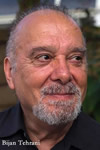 Bijan Tehrani
Bijan Tehrani
Bijan Tehrani is president and founder of Cinema Without Borders Foundation and Editor in Chief of Cinema Without Borders & CineEqul two on-line publications dedicated to international and social justice cinema. Bijan has been an award winning writer and film director that has also received multiple awards for his services for promoting international cinema in US and around the globe.
Bijan Tehrani’s experience as animation film writer and director and film historian inspired him to run tELAC International Animation Day since 2015 as the festival director.
Organizers:
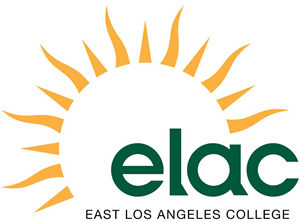 East Los Angeles College
East Los Angeles College
East Los Angeles College (ELAC) is accredited by the Accrediting Commission for Community and Junior Colleges (ACCJC), Western Association of Schools and Colleges (WASC). ELAC is one of nine colleges in the Los Angeles Community College District (LACCD) The College was established in 1945 and is situated in a secure, comfortable environment in the suburban community of Monterey Park, conveniently located 8 miles east of downtown Los Angeles. Our multicultural student body of over 30,000 students complements the communities that ELAC serves. ELAC grants Associate in Arts/Science (A.A./A.S.) degrees as well as Certificate Programs.
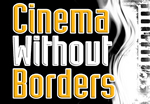 Cinema Without Borders Foundation
Cinema Without Borders Foundation
Cinema Without Borders (www.cinemawithoutborders.com) is an international cinema webzine dedicated to covering and discovering the news, reviews, trends and new artistic milestones in independent film and filmmaking worldwide. Cinema Without Borders Foundation is a non-profit organization supporting independent and international cinema and filmmakers.
Hungarian Animation Day Partners:
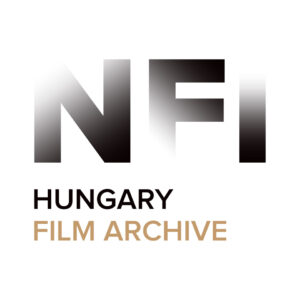 National Film Institute Hungary – Film Archive: The Film Archive is a division of the National Film Institute Hungary public institution. The Archive’s duties contain collection, acquisition, preservation, restoration, screening and professional storage of the Hungarian features, documentaries, newsreels, animations, popular science films and classics of world cinema.
National Film Institute Hungary – Film Archive: The Film Archive is a division of the National Film Institute Hungary public institution. The Archive’s duties contain collection, acquisition, preservation, restoration, screening and professional storage of the Hungarian features, documentaries, newsreels, animations, popular science films and classics of world cinema.
KEDD Animation Studio: Oscar-nominee Géza M. Tóth is the founder and leader of KEDD Animation Studio. In  the KEDD Studio they produce popular creative series for kids and individual short films. KEDD’s films participated at international festivals worldwide. Apart from Academy Award nominee MAESTRO, KEDD’s productions were recognized with more than 120 prizes. In addition to the production and development of individual animated films and children’s series in the studio, the company sells films on the largest film platforms as a distributor. KEDD is the largest children content supplier to all kinds of content providers (TV channels etc.). The studio makes its own-produced and distributed children’s content continuously available on KEDDnetwork’s YouTube channel, which is one of the biggest channels in Hungary. They also have a merchandising department, in Kedd’s webshop they sell all kinds of animation related products.
the KEDD Studio they produce popular creative series for kids and individual short films. KEDD’s films participated at international festivals worldwide. Apart from Academy Award nominee MAESTRO, KEDD’s productions were recognized with more than 120 prizes. In addition to the production and development of individual animated films and children’s series in the studio, the company sells films on the largest film platforms as a distributor. KEDD is the largest children content supplier to all kinds of content providers (TV channels etc.). The studio makes its own-produced and distributed children’s content continuously available on KEDDnetwork’s YouTube channel, which is one of the biggest channels in Hungary. They also have a merchandising department, in Kedd’s webshop they sell all kinds of animation related products.
Hungarian Animation Day Supporting Partners: Animation Magazine, Hungarian Film Festival of Los Angeles, Immigrant Magazine, Polish Film Festival LA, Scandinavian Film Festival L.A. and Southeast European Film Festival Los Angeles
Subtitles by; Stephen Majors

